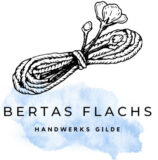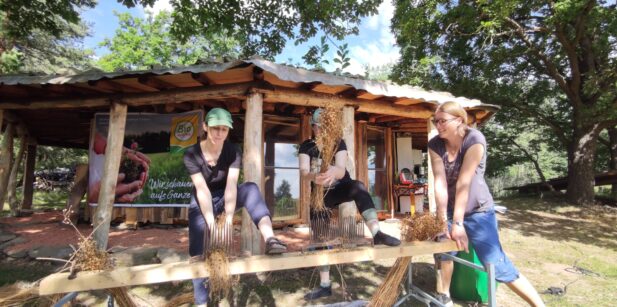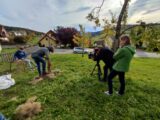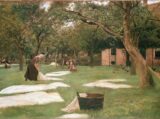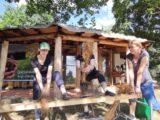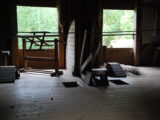Yes, I live in a bubble. A bubble that is characterised by people who love textiles as much as I do. People who see the beauty in the fibres, the threads, the fabrics, the work of so many hands. On the last flax breaking day, 13 people from 3 months to early 60s worked together. We discovered fibres, spun, talked, laughed but also sweated and were dusted down to our underwear. It was great!
If you take a step back, out of the bubble, the work that people did every day not so long ago to feed, clothe and warm themselves may seem insignificant. Nobody has to spin and weave and have clothes anymore, a full stomach no longer depends on whether the small vegetable or wheat harvest turns out well, houses are warm even if no axe has chopped up the wood beforehand. It's all over. Everything is better now - more modern, more pleasant, simpler. After all, we are evolving, swapping hard physical labour for less hard-won prosperity. We don't hunt mammoths any more. We can't, they don't exist any more. But the broom maker and the twister no longer exist either. No more wainwrights making wheels and barrels, no more ropemakers operating their rope trestles, no more farmers having to weave baskets or carve clogs in winter. That's a good thing, many people say, not everything has to be carried on if it has become obsolete.
But is it really?
"obsolētus" (Latin) means "old", "worn out" and also "everyday" - it does not mean meaningless. How much beauty there is in these old, worn, everyday things. They remind us of people, of a life that has been lived, of the past and this is where it starts to come to a head, because not every past was always beautiful. Anyone who has travelled all the way from linseed to textile gets an idea of how hard this life must have been. Old, worn-out things also remind us of poverty. Of times when nothing could simply be replaced until it was really broken, and who wants to be poor? Especially when everyone around you is slowly moving towards prosperity. We became a society that couldn't say goodbye to the past fast enough - looking ahead to the future, the present almost an annoyance, because only progress promised happiness and contentment.
Sure, nobody wants to remember hard times, but aren't we just throwing the baby out with the bathwater? What about the many nice little moments that the hard working day also had to offer? "It was great when mum was having fun in the warm parlour in winter" - Rosa, Maria and Anna remember this too. The women are now 80 or older. They worked hard as young women and certainly don't wish for the past back in its entirety, but they like to be reminded of what working together was like - namely satisfying, fulfilling and proud.
So it does something to our society when we willingly sacrifice old knowledge and craftsmanship on the altar of progress. We are losing a piece of history that can be felt, not just read. A piece of identity, a piece of belonging. It was only with the industrial revolution almost 300 years ago that we in the global North slowly began to distance ourselves from the lives of our Bronze Age ancestors. For 7,300 years, we lived more or less directly from the fruits of our labour. When Anna talks about her childhood in the Mühlviertel in the 1930s, she is much closer to the story of a girl from Bronze Age Hallstatt than to the everyday life of a modern child. In less than 100 years, we have disposed of everything that defined many generations before us.
Of course, I don't necessarily want to have to wash at the well in sub-zero temperatures and live solely on turnips, cabbage and potatoes in winter, but I don't want to lose all the good things of the past. If we as a society can't (and don't want to) afford to work online, remotely and flexibly as well as knowing how to break flax, bind a broom or make a wire basket.
Old craftsmanship is certainly obsolete, but it's not pointless and it's also good for you. Why else would more and more people come together year after year to immerse themselves in the world of linen making with me? When heart, brain and hands work together to hold a small piece of linen that has grown in your own garden in your hands with shining eyes after a year, then it becomes clear what we lose if we simply let the craft go.
